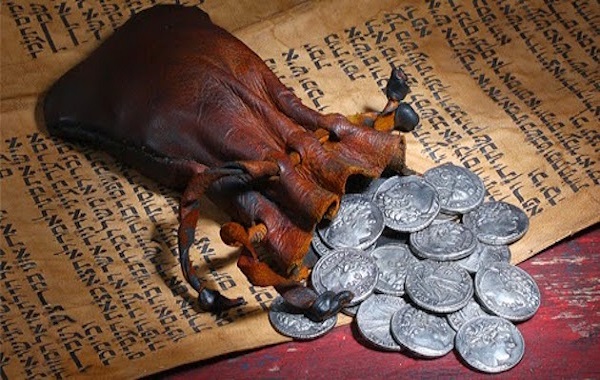Avarice, the Grave Sickness of the Soul
19 October 2018‘Provide purses for yourselves that will not wear out, a treasure in heaven that will never fail, where no thief comes near’ (Lk. 12, 33)
‘Avarice is the root of all evils’ (I Tim. 6, 10)
Of all the sicknesses that befall the human soul, the most repulsive, in my view is avarice, or miserliness. I’ve abhorred it since I was a child. And now, although my opinion on many things has changed with age, I still feel the same about people being tight-fisted. I’d rather have dealings with a murderer than with a miser. Because a murderer might have killed in the heat of the moment, in anger, and then have repented afterwards, but a miser’s an ice-cold calculator, rotten to the core. In a murderer you can find some emotions, but not in a miser. Misers are certainly only ever selfish, loving nothing except themselves, and often enough they’re monsters worse than egotists, because they may not love even themselves, preferring instead to die of hunger.

This shows that people can be reduced to a state that no other living creature can reach. Only we, who call ourselves ‘lords of creation’ can plumb such depths of stupidity whereby, from our miserliness, we hide money in a mattress or a pillow and then die of hunger. Have you ever seen a dog that’s a miser? Or a donkey with a lot of hay to eat, but doesn’t do so and is then found dead from starvation? You see how misers end up mad and, indeed, the most unlikable and antipathetic of all lunatics.
But even those who are just normal misers and haven’t reached this state of passion that I mentioned still have an air of coldness about them. You feel wary about approaching them. You can’t relax with them because they’re all buttoned up, ‘tied up in string’, as it were. Because being tight-fisted has made them hypocritical and mistrustful.
Money’s a dangerous thing, very deleterious to the soul. A lot of people start off by being careful with it, and slowly become avaricious, until they’re pinned down by Mammon. Through avarice, the human heart shrinks, just as it expands through generosity. Misers are also miserly in their emotions. They’re unable to harbour charitable feelings. How can such people make sacrifices for others?
The love of money has brought down upon humanity the greatest calamities. Judas the avaricious betrayed Christ. Most quarrels between people, most fights within families, the wars that devastate the earth and cover it in blood are caused by accursed money. Self-interest.
During Great Week, the Church sings many hymns condemning avarice. It calls Judas ‘offspring of vipers, conspirator, traitor, malefactor’ and enjoins us to cast off avarice.
This wicked sickness is both widespread and very serious today, a universal passion, in the East and West, that eats away at the heart like a cancer. People have never loved money so much as they do today. Because nowadays we’re materialists, we don’t believe in the next life, and, since we don’t believe in God, we go flat out to enjoy this present life. This life that, before you manage to see it properly, flees and vanishes, like a shadow. It’s this shadow that wretched people are chasing today. They torture and kill themselves over this shadow, in the belief that money matters.
I’ve known lots of people who are very well off and I’ve seen their anxiety and their miserable happiness. I don’t mean those who are prevented from enjoying this life because of illness or some other calamity. I mean those who have their health and all the means to live well. They have everything except happiness. Real happiness is a distant prospect for them, in the first place because life’s an unstable thing, like the needle of Nasruddin Hodja*. Happiness without security is impossible. Rich people are all anxious because they don’t know what tomorrow will bring, what they’ll find ‘the morn’s morning’. Moreover, wealth brings turmoil, confusion and cares. Careworn people can’t be happy, because they’re never alone with themselves. And if you’re never alone with yourself, you’ll never recognize what sort of thing happiness is. The spring from which happiness flows is neither the bank, nor lucre, but the human heart.
Source: agiazoni.gr






